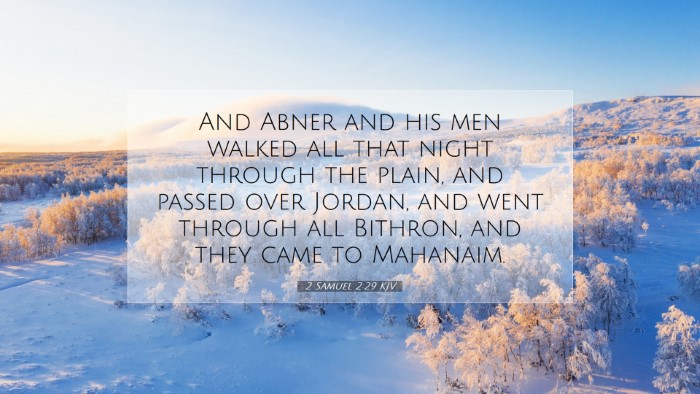Commentary on 2 Samuel 2:29
Verse Text: "And Abner and his men went on all night through the plain, and passed over Jordan; and went through all Bithron, and they came to Mahanaim."
Introduction
The narrative in 2 Samuel 2:29 marks a significant moment in the early dynamics of the kingdom of Israel post-Saul’s death. This commentary will summarize insights from various public domain sources, contributing a rich understanding suitable for pastors, students, theologians, and scholars.
Contextual Background
At this juncture in Israel's history, David has been anointed king in Hebron, while Ishbosheth, Saul's son, is proclaimed king in Mahanaim by Abner, Saul's former general. The division of loyalty and power sets the stage for the events that unfold.
Historical Setting
According to Clarke, the division following Saul's death was inevitable due to the existing tribal loyalties and political ambitions. The factions within Israel lead to significant strife, reflecting the complexity of leadership succession and the political landscape of the time.
Character Analysis: Abner
Abner, as noted by Matthew Henry, plays a pivotal role. He is depicted both as a powerful military leader and a strategic thinker. His decision to align Ishbosheth with Mahanaim suggests a calculated move to bolster Saul’s dynasty, despite the death of Saul.
Verse Breakdown
This verse can be dissected into components to appreciate its full meaning:
- Travel Through the Plain: Abner and his men ‘went on all night through the plain’ indicates their urgency and purpose. Barnes comments on the physical challenges they faced, reflecting the determination of leaders in times of crisis.
- Over Jordan: The crossing of the Jordan symbolizes both geographical and political boundaries. This is not merely a physical act but represents a transition for the leadership of Israel.
- Bithron to Mahanaim: The journey from Bithron to Mahanaim reinforces the strategic location of Mahanaim. Matthew Henry highlights that Mahanaim functioned as a refuge and stronghold for those loyal to Saul’s memory, further hinting at the tensions surrounding territorial claims.
Theological Implications
This brief passage invites deeper theological reflection on the nature of leadership and divine sovereignty.
- God’s Sovereignty: The fragmentation of the kingdom underscores God's ultimate control over nations and leaders. Clarke asserts that despite human efforts, God's will prevails in the selection of Israel's rulers.
- Human Ambition: Abner's actions illustrate the complexities of ambition and loyalty. His attempt to preserve Saul's legacy shows the struggle between divine ordination and human initiative.
- Conflict and Resolution: The movement of Abner and his men illustrates the conflict that arises from competing claims to leadership. It reminds readers and leaders alike of the ongoing tension between different factions within the body of Christ today.
Pastoral Applications
For pastors and spiritual leaders, this verse speaks volumes on the attributes required in ministry and leadership:
- Commitment: Just as Abner showed commitment to his cause, leaders must exhibit unwavering commitment to their calling, even amidst uncertainty.
- Strategy: Leaders must think strategically about the impact of their decisions, understanding the spiritual and communal dynamics at play.
- Unity vs. Division: The need for unity in ministry resonates in this passage. As Abner attempts to solidify Saul’s lineage, leaders today are called to foster unity in the Body of Christ rather than division.
Conclusion
2 Samuel 2:29, while a narrative detail in a larger story, serves as a powerful illustration of the tensions in leadership, the complexity of alliances, and the overarching sovereignty of God. For those engaged in spiritual formation—be it through study, pastoral care, or scholarly inquiry—this verse encapsulates essential lessons on fidelity, strategy, and the importance of divine guidance in navigating leadership challenges.


